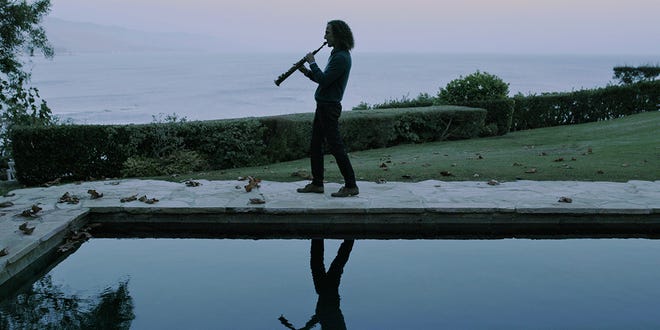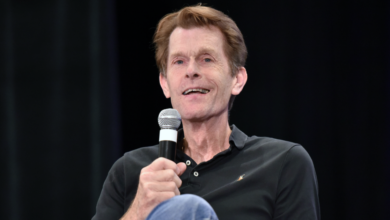
When some folks randomly hear a Kenny G song in a mall or at a waiting room, they’ll go, “Ugh, not him again.” Not so with Kenny G.
“When I'm in an elevator in like, Wuhan, China, and I hear my music, I go, ‘Wow.’ And then when I'm on the flight to China and they play one of my songs, sometimes I stand up and go, ‘Excuse me, everybody. That's me! Where's my royalties, China?’ ” Kenny G quips with a laugh. “I don't say the last part, by the way. I never say the last part.”
Whatever you think about his ubiquitous mega-hits like “Songbird” and “Silhouette” from the 1980s and ‘90s, Kenny G (real name: Kenny Gorelick) comes off as a fun, self-deprecating guy – who just happens to play a soprano saxophone like nobody else – in the new documentary “Listening to Kenny G,” premiering Saturday night at the Toronto Film Festival.
Ranked:All the best movies we saw at Toronto Film Festival (including sci-fi epic 'Dune')

Director Penny Lane’s film (which airs on HBO and HBO Max Dec. 3) chronicles Kenny’s G journey from a Jewish teenager in his Seattle high school jazz band to one of the best-selling musical artists of all time. But “Listening” also examines why some people love and others despise Kenny G’s works, letting several critics opine on what exactly is so detestable about his “smooth jazz” jams.
“When (Lane) put the film together, she warned me, ‘You're going to hate the first 10 minutes, but please get past that and trust me, at the end of the movie, you win,’ ” Kenny G says. “Honestly, the first 10 minutes was nothing I hadn't seen or heard before so it wasn't that big of a deal.” He was more offended by Lane’s inclusion of his cheesy first video, for 1983’s “Hi, How Ya Doin’?”: “It was just awful. Watching that made me cringe.”
The Grammy-winning musician, 65, chats with USA TODAY via Zoom from Toronto about the new film, a key moment in his career and the last time he got a haircut.
Question: You’ve sold more than 75 million albums, China embraced your song "Going Home" as a national anthem of sorts, and you've even won some golf trophies. Where does having your own documentary rank in terms of life accomplishments?
Kenny G: It's really at the top, like some of those things you mentioned, because it's not something that I ever thought was going to happen. I still can't really believe that this thing actually saw the light of day. I thought, "OK, they talked about doing this documentary. But as soon as you delve into me, you're going to go, eh, we don't need to do this. This is not that interesting." But all of a sudden it's done and now we're in the Toronto Film Festival. It's pretty amazing. I'm literally stoked about it.
Q: Did any of the critics featured in “Listening” make any points about your music or hit upon something you hadn’t thought about before?
Kenny G: Nope, not one of them, to be honest with you. (Laughs) It doesn't really matter what they say. I turn my music in and I've heard Clive Davis tell me things that he wants different: "Kenny, it needs more snare drum." And I take it back and I'm thinking, “This is not correct. I'm just going to leave it the way it is, or I'm going to minorly tweak it.” I can do that with Clive Davis, so if there's a stranger telling me his or her opinion about what I should be doing with my music, that is going to be meaningless to me.
Q: It blew my mind a little bit that your career hinged on you going rogue on “The Tonight Show” in 1986 and playing “Songbird” – which soon after became a huge radio hit – instead of the song you were supposed to perform. How much trouble were you in afterward?
Kenny G: I was screamed at and yelled at and chastised and chewed out like I've never been before. (But) before that my manager was sitting in the (green) room and I said to him, “When the curtain goes up, I'm going to play a different song.” He goes, “This is your life. You do what you think is the best thing. Screw everybody else.” So I did my thing and then I got really chewed out over it. And I thought, “OK, I might've just blown my whole career. You're never going to be on TV again.”

Q: In the doc, you say you don't think you're a personality to people, you're a sound. Is there something magical that happens between you and a soprano sax?
Kenny G: Absolutely there is. The first time I played my soprano, I was 17 – still the same soprano, by the way. My goal was to sound like Grover Washington Jr. I play it, my friends in band go, “That doesn't sound like a soprano sax.” And I go, “I know! Jesus.” And so I keep playing and I can't make this thing sound like anything other than the way it sounds. It's always been that different sound and eventually I learned to like it.
Q: So you’ve had the same horn since 17, traveled the world for decades and never lost it?
Kenny G: I’m so attached to it. That thing is always with me. It's not with me right this minute: It’s up in my hotel room, hidden, just in case somehow housekeeping comes there and decides that they know that soprano sax is there and they want to take it.

Q: You also mention that you don't think you could ever cut your signature curls. During the lockdown, how did you keep them trimmed and not growing out of control?
Kenny G: I haven't had a haircut in two years. I can tell you this, if I cut my hair (a half inch), it looks like I cut (a foot). There's one guy I go see, and he says, “OK, are we ready to do the pretend haircut?” He might cut a little bit here and there, but yeah, curly hair just kind of stays the way it is. It doesn't get much longer and hopefully it won’t get much shorter.
Q: After watching the completed film, do you feel you've learned anything new about yourself?
Kenny G: Some of the past footage I had forgotten that I did. And so when I saw it, I went, “Oh my gosh, did I look like that?! I wore that shirt?” Some of that stuff brought back memories, but some of it was like, “I don't even remember being there and doing that.” And that's cool, seeing myself that young. Maybe some of the things that I said in the past, like from past interviews, I think, “Wow, I guess I'm a lot smarter than I was then.”
Source link






